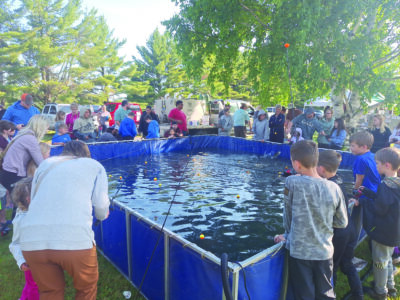Children’s Remembrance Walk addresses impact of Native American boarding schools

Garrett Neese / Daily Mining Gazette About 75 people walk from the ruins of the former Old St. Joseph Orphanage and School in Assinins as part of the second annual Children’s Remembrance Walk Friday.
ASSININS — Over more than a century, federally-run boarding schools for Native American children followed the principle articulated by Carlisle School founder Richard Pratt — “Kill the Indian in him, and save the man.”
The acts that followed, from forbidding the speaking of native languages to acts of physical abuse, left thousands of Native Americans feeling disconnected from their culture and led many to turn to drugs or alcohol to numb their pain, former students said.
“It’s one of the root causes we have of the disparities in our communities,” said Cecelia LaPointe, founder and executive director of Native Justice. “It’s the result of a genocidal policy, a result of the historical and intergenerational trauma from the boarding schools. To call it a boarding school, you should basically never do that. It was basically in many ways, a torture chamber.”
Friday’s walk was part of the kickoff of a concerted effort to spread the word of what happened, promote healing for survivors and protect today’s Native American children from abuse.
The Michigan Truth and Reconciliation Commission, launched by the non-profit Native Justice Coalition, preceded Friday’s walk with speakers and a dinner Wednesday at Zeba Hall.
The non-profit plans to link with the federal government’s work in investigating what happened at the various schools, spending a minimum of 10 years to pursue restorative justice and promote healing. U.S. Secretary of the Interior Deb Haaland ordered a federal investigation of the schools in 2021, the same year more than 1,500 graves were discovered at similar Native American boarding schools in Canada.
More than 75 people took part in Friday’s walk. It began near the ruins of the Old St. Joseph Orphanage and School in Assinins, one of three federally-run schools in Michigan. Primarily an orphanage, it operated for about 90 years starting in 1860.
“We have to understand that there was different things that occurred in different schools, and understanding the different dynamics, but the effects on our communities has been incredibly detrimental for a long time,” LaPointe said.
Linda Cobe, a member of the task force and a Lac Vieux Desert Band tribal member, was 5 when she was taken to the Holy Childhood of Jesus Catholic Church and Indian School in Harbor Springs.
“I remember the loneliness, the children crying every night for their parents, and not being able to understand why we were there,” she said. “It was a fearful time, because you got beat a lot for little infractions, and it was very demeaning, humiliating, cruel at times … you grow up, and you look back at the hypocrisy of what they were trying to teach us with Christinaity and then treating innocent children like they did.”
In her siblings, the trauma manifested in poor health, she said. Two older brothers who attended the school for longer than she did died in their 20s. Her sisters, one of whom went to the school, developed diabetes. Cobe’s suffered from health issues including hypertension.
“I went through a lot of personal problems, and it was a struggle to get back on my feet, to make something of myself, after you’re told all the negative, ‘You’re no good, you’ll never amount oto anything,'” she said.
See Remembrance page 6A
Continued from page 1A
Cobe is now a member of the commission’s task force, helping to set policy and strategy. Her goal is to help people heal.
“Getting back to our culture … our cultural values, our language,” she said.
Cobe’s cousin, Bob Hazen, was 6 when he was taken to Harbor Springs in 1955. They would be beaten if they spoke Ojibwe. Girls were given page cuts, while boys were shaved bald, he said. The school leaders put delousing powder on them, “even though we didn’t have lice,” Hazen said.
“They called us pagans and heathens, said we were nothing but trash,” he said. “They made us pray all the time. They tried to break the bonds of the families. They achieved that by telling us we were no good — the color of our skin and our beliefs … when you’re told you’re going to go to hell all the time, why should you be good?”
As a result, many people turned to drugs and alcohol, including Hazen’s brother, who recently died of complications from alcoholism.
Even once the boarding schools closed, many of those traumas were passed down to future generations, Hazen said. But acknowledging what happened can help put an end to it.
For the past eight years, he’s been teaching a class on intergenerational trauma at Lac Vieux Desert.
In turning his own life around, he helped, the next generation. His son is pursuing a bachelor’s degree at Michigan Technological University, and hopes to someday become a professor. His son’s girlfriend, a member of the Keweenaw Bay Indian Community, is teaching his son about the Ojibwe culture. In turn, Hazen’s learning from his son.
“I’m going to learn my native language again,” he said. “It’s in here, but I can’t reach it. Eventually I will.”
Editor’s Note: In Friday’s edition an article about People of the Heart Water Walkers included information about the Remembrance Walk and incorrectly described the event as a water walk.





